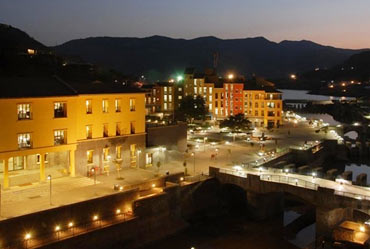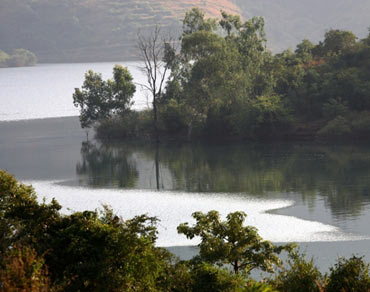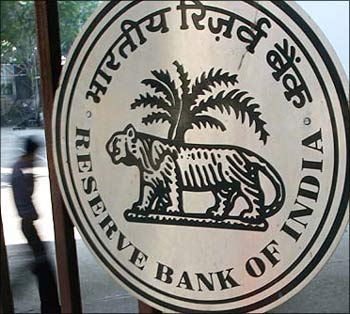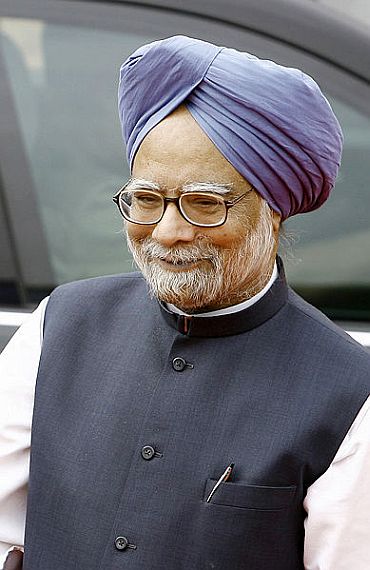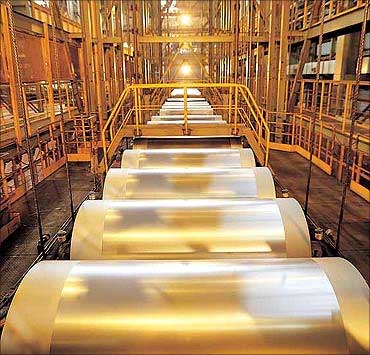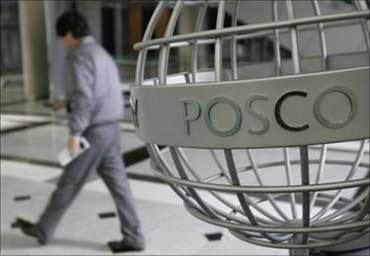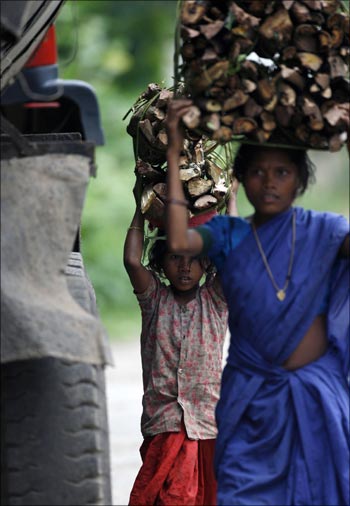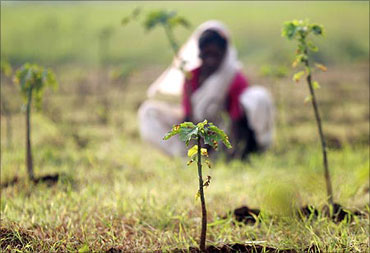 | « Back to article | Print this article |
Environment under attack: Why India will pay dearly
Posco was cleared because it is India's largest FDI project and the South Korean government lobbied for it. Such things don't happen in democracies which respect the rule of law, says Praful Bidwai.
Our rulers have found a new vocation or cause -- maligning environmentalists and questioning the very idea of regulating industry against pollution.
Thus, faced with criticism of the Lavasa city project, in which his family has invested crores (tens of millions), Agriculture Minister Sharad Pawar lashed out at activist Medha Patkar and other 'vested interests' for obstructing this 'pioneering' project.
However, Lavasa involves horrifying illegalities and environmental destruction.
The promoters built this artificial gated community of the super-rich without even seeking prior permission, which is mandatory for construction at altitudes above 1,000 metres.
Click NEXT to read on . . .
Environment under attack: Why India to pay dearly!
Virgin rainforests were destroyed, hills flattened, rivers and streams diverted, and non-transferable Adivasi land was grabbed.
The promoters should be criminally prosecuted and ordered to undo the environmental damage to the maximum extent possible.
Construction which violates the Forest Act, Environmental Protection Act and laws protecting Adivasis against land-grabbers should be demolished following the same principle that the ministry of environment and forests has applied to Mumbai's Adarsh society.
Instead, the MoEF has decided to clear Lavasa with a laughably low penalty.
Click NEXT to read on . . .
Environment under attack: Why India will pay dearly
Take the normally cautious Reserve Bank of India. It blames India's supposedly strict environmental regulations for a 36 per cent decline in foreign direct investment during April-September 2010 over the same period the previous year.
But this only has a tenuous correlation with environmental regulation.
The FDI decrease is better explained by a downturn in the Indian stock market, core sector industries' under-performance, poor infrastructure, and changes in international capital flows.
Click NEXT to read on . . .
Environment under attack: Why India will pay dearly
In the same vein, Prime Minister Manmohan Singh raised an alarm against an environmental 'licence-permit raj'.
He told a meeting on sustainable development, of all things, that 'incentives' must encourage 'all economic decision-makers' to act in 'environmentally benign' ways.
But 'it is also necessary to ensure that these regulatory standards do not bring back the licence-permit raj .'
These are loaded phrases, calculated to censor all criticism. But the record shows that the MoEF has been overly generous in granting environmental approvals even to dubious projects.
Click NEXT to read on . . .
Environment under attack: Why India will pay dearly
This process involves preparation of an Environmental Impact Assessment, a public hearing, and review by expert committees housed within the MoEF.
Most EIAs are incomplete, inaccurate, or otherwise flawed. I know this from my experience as a member of the MoEF's Expert Committee on River Valley Projects in the 1990s.
India's best-known ecologist, Madhav Gadgil, confirms that EIAs are flawed 'almost without exception'.
Most EIAs are hurriedly approved under promoter pressure. In the past 18 months, almost four proposals were approved every working day in four sectors alone!
This shows slipshod scrutiny. Of the 769 projects proposed between August 2009 and July 2010, only six were rejected.
As a face-saving measure, some 'conditions' are usually added to clearances.
Click NEXT to read on . . .
Environment under attack: Why India will pay dearly
However, the MoEF doesn't monitor compliance with these. It doesn't have enough personnel. MoEF minister Jairam Ramesh himself admits: in the past decade, 'we must have approved about 7,000 projects , each [with] conditions and safeguards . But unfortunately, we do not have a system of monitoring compliance .'
Many conditions are vague and don't address the approved project's basic flaws.
For instance, asking Nuclear Power Corporation to commission a biodiversity study around the Jaitapur nuclear site won't prevent destruction of endangered species or biodiversity loss.
Nor will 'conditions' remedy the inherent hazards of nuclear power, including radiation releases, potential for catastrophic accidents, or dangerous long-acting wastes, which can't be safely stored.
Click NEXT to read on . . .
Environment under attack: Why India will pay dearly
Mr Ramesh has failed to reform this system. Initially, he introduced some transparency in the MoEF, engaged in public consultation, and took a good position on Bt brinjal.
But over the past year, he has been on a project clearance spree: the Navi Mumbai airport, Lavasa, the Polavaram dam in Andhra, mining in forests in Orissa and Jharkhand, the Subarnarekha dam in Uttarakhand, and a ropeway in Gujarat's Girnair sanctuary, the only place where the Asiatic lion survives.
Click NEXT to read on . . .
Environment under attack: Why India will pay dearly
On top of this comes the clearance for Posco's giant 12-million-tonnes-a-year steel mill, captive power plant, and a new port in Orissa -- all for export.
This project will directly uproot 22,000 people in the core-area, affect another 20-25,000, devour 3,096 acres of forest, wreck a prosperous agrarian economy, denude the Mahanadi delta of water, and intrude into fish-breeding grounds and the habitat of endangered species such as Olive Ridley turtles.
Posco will adversely affect the coastal topography, making it more vulnerable to cyclones. It will fell 280,000 trees.
It will significantly lower the quality and availability of water in an already water-stressed area. Its impact on public health will be heavy.
The MoEF granted Posco three clearances (environmental, forest and coastal regulatory zone-related) while trampling upon the recommendations of committees it itself established.
It went against its own past orders which had rightly cancelled the clearance granted in December 2009.
Click NEXT to read on . . .
Environment under attack: Why India will pay dearly
Two committees were established under former civil servants NC Saxena and Meena Gupta to investigate compliance with the Scheduled Tribes and Other Traditional Forest-Dwellers (Recognition of Forest Rights) 2006 Act (FRA), and on Posco-specific issues.
Their reports were examined by the MoEF's statutory Forest Advisory Committee. All three recommended that the project be refused environmental clearance. The MoEF overruled them.
The MoEF was even more obnoxiously wrong on forest clearance.
The FRA is one India's best recent laws, which transfers forest land titles to Adivasis and others who have lived there for 75 years, are dependent on forests/forest land for livelihoods, and were in occupation of the land before December 2005.
The FRA gives gram sabhas (village assemblies) veto power over diversion of forest land.
The Saxena and Gupta committees conclusively state that the FRA has not been implemented in the project area, and the Orissa government has failed to furnish certificates from gram sabhas stating that they have consented to forest land diversion.
Click NEXT to read on . . .
Environment under attack: Why India will pay dearly
The MoEF introduced a sleight-of-hand here through one of 60 'conditions' -- namely, the Orissa government should offer a 'categorical assurance' that no people exist in the area who are eligible under the FRA -- although 4,000 non-tribal families live there, besides a small number of Adivasis.
But the state government cannot determine such eligibility. The FRA stipulates a three-step process for this, at the village, tehsil and district levels. The state government has no role in it.
The Orissa government isn't impartial. It has openly lobbied for the Posco project. Indeed, it started taking land for it last July in contravention of the MoEF's orders and had to be stopped.
The Gupta committee called its conduct 'criminal' and recommended that clearance must be refused on this ground too.
The committee also explicitly warned against clearances with 'conditions' which obviate 'hard decisions on crucial issues' and violate public accountability.
The MoEF thus became complicit in the state government's plan to obliterate the existence of 22,000 flesh-and-blood people in the project area.
Click NEXT to read on . . .
Environment under attack: Why India will pay dearly
It also legitimised a bad, illegal EIA public hearing, which was vitiated by intimidatory police deployment and held far away from the affected villages.
The Coastal Regulatory Zone-related clearance was equally farcical. Large segments of the project fall under CRZ-III, where industrial activities are prohibited.
Construction of a new port will damage the coastal ecology and adversely affect Paradeep port. Such damage will have serious consequences in a cyclone-prone region.
Here too, the MoEF overruled the Gupta committee. The 'conditions' it imposed are pure 'greenwash'. This subverts the Indian state's authority and its obligation to protect vulnerable people and the environment.
As if this were not bad enough, the project's clearance will impose a huge burden on the exchequer through tax write-offs.
The plant and port would be in a Special Economic Zone. The extraction of 600 million tonnes of iron ore, the highest grade found in India, will allow Posco to make annual super-profits of Rs 6,500 crore (Rs 65 billion) for 30 years.
Click NEXT to read on . . .
Environment under attack: Why India will pay dearly
It will thus recover its entire investment of $12 billion (Rs 54,000 crore) in the first eight years alone.
The project area has a flourishing agrarian economy. People earn as much as Rs 40,000 per one-hundredth of an acre through betel-leaf cultivation.
The government has offered a one-time compensation of Rs 11,500 for this land. The project will create only 7,000 jobs directly, most of which won't go to the local people because they lack industrial skills.
The people of the project-affected area understand this and have waged a resolute and peaceful struggle against Posco for five years.
The government has repressed this by brutal methods, including slapping trumped-up charges against Posco Pratirodh Sangram Samiti activists, attacking them with goons in November 2007, and opening fire upon them in May 2010, injuring more than 200. PPSS leader Abhay Sahu has 44 cases against him.
Posco was cleared because it is India's largest FDI project and the South Korean government lobbied for it. Such things don't happen in democracies which respect the rule of law.
They happen in Banana Republics, which put 'investor confidence' above protecting livelihoods and the environment.
India will pay a high price for subverting its own laws and sacrificing the public interest, including loss of stature in the international community.
